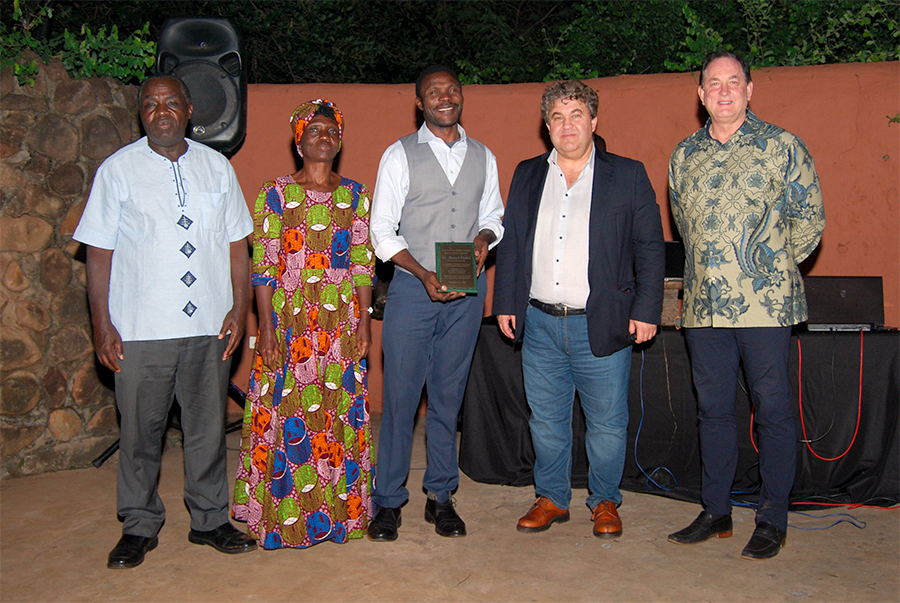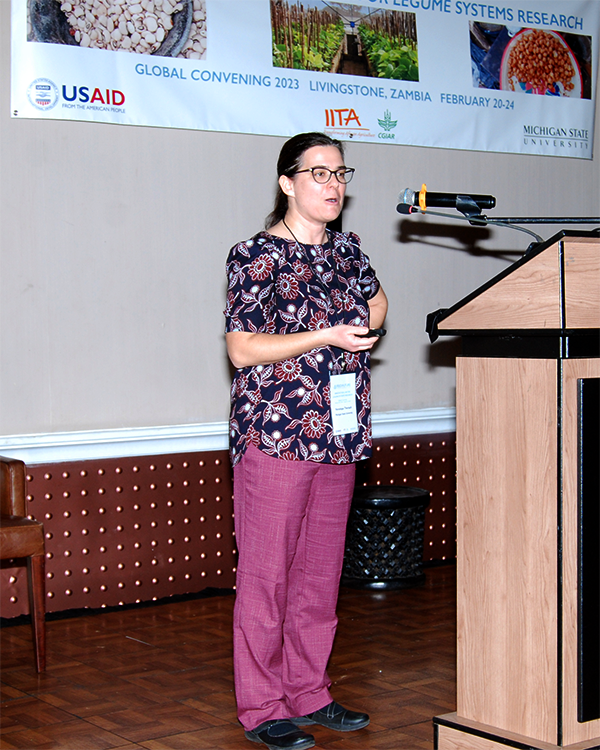FSG well represented at the Legume Lab Global Convening
Michael Olabisi Recognized with Early Career Grain Legume Scientist Award at The Feed the Future Innovation Lab for Legume Systems Research 2023 Global Convening
Livingstone, Zambia — The Feed the Future Innovation Lab for Legume Systems Research hosted over 120 participants during Global Convening 2023, which was held February 20-24 in Livingstone, Zambia. At the event, the prestigious Early Career Grain Legume Scientist Award has been awarded to Michael Olabisi, an assistant professor in the department of Agricultural Food and Resource Economics(AFRE) and the Department of Community Sustainability. The award was presented by the Legume Lab Technical Management Advisory Committee (TMAC).
 "It is exciting to win the award, and to be recognized as a rising star in the field – that said, credit should rightly go to the amazing team that made our project shine," said Olabisi.
"It is exciting to win the award, and to be recognized as a rising star in the field – that said, credit should rightly go to the amazing team that made our project shine," said Olabisi.
The Early Career Grain Legume Scientist Award is given to researchers who have demonstrated a commitment to serving and improving the livelihoods of stakeholders in grain and legume value chains in developing countries through research on grain and legume systems. Olabisi was recognized with the award at the conference, where he and other researchers had the opportunity to engage with stakeholders and give presentations to an audience of fellow scientists and industry leaders.
Olabisi has worked with international scholars on research visits to Singapore and Beijing, with support from the National Science Foundation and the Center for International Business Education and Research (CIBER). Through his research, Olabisi studies how to achieve the sustainable development goals through trade, and the barriers that hold back low-income economies and communities. He has also demonstrated international leadership and innovation in grain legume system research.
At the Global Convening, FSG Interim Co-Director, Mywish Maredia presented a study on the adoption of mobile technologies in the legume value chain in Nigeria, where her team examined the coverage and adoption of mobile phones by men and women in legume value chains in Nigeria and explored policy relevant questions surrounding the gender gap in the rate of adoption of mobile technologies. The study found that ownership of smartphones and use of mobile apps among both men and women was positively correlated with education, being an intermediary, and business size. Significantly more women cited lack of awareness as a reason for not using a given mobile technology. Their results suggest that raising awareness of mobile technologies among women should be a high priority to narrow the gender gap.
 Veronique Theriault, Associate Professor in AFRE presented a study on gender-differentiated sales of cowpea grain in local markets in Senegal. Statistical results of the study confirm that separate regressions should be estimated for men and women because of the dissimilarity of factors affecting sales. They found significant differences between men and women cowpea vendors. Theriault stated that women represent over one-third of retailers of cowpea grain but only 6 percent of wholesalers. Women have fewer household members or employees helping them in their business but are more likely to have assistance from their children. Men are more likely to pay taxes on market sales, less likely to use financial assistance, and more likely to use credit.
Veronique Theriault, Associate Professor in AFRE presented a study on gender-differentiated sales of cowpea grain in local markets in Senegal. Statistical results of the study confirm that separate regressions should be estimated for men and women because of the dissimilarity of factors affecting sales. They found significant differences between men and women cowpea vendors. Theriault stated that women represent over one-third of retailers of cowpea grain but only 6 percent of wholesalers. Women have fewer household members or employees helping them in their business but are more likely to have assistance from their children. Men are more likely to pay taxes on market sales, less likely to use financial assistance, and more likely to use credit.
Theriault continued to present on behalf of Melinda Smale who is a professor at Michigan State in the Department of Agricultural, Food, and Resource Economics. Smale’s research speaks to input subsidy policies and how that can affect the legume farming landscape. Subsidies may particularly affect the situation of women and young family members who rely on them to meet personal needs. The research will enhance comprehension of the unanticipated consequences of fertilizer subsidies on the cowpea value chain in Burkina Faso and Mali by examining the effect of fertilizer subsidies on production diversity, cowpea area shares, plot counts, and spatial indices of crop diversity on farms and villages. This will also include information on the gender- and youth-differentiated effects of fertilizer subsidies on cowpea production, quantities sold and revenues. Lastly, the research examined whether on-farm crop diversity or market participation most influences the dietary intake of women of reproductive age.
Hanna Carlson is a PhD Student & GSO President in the Department of Agricultural, Food, and Resource Economics. Carlson presented research on the determinants of participation in processed cowpea markets with evidence from Senegal. Of the 955 observations in a nationally representative sample of market vendors in open-aired markets across Senegal, 253 vendors sell processed cowpea products, with 247 of these vendors being women. Carlson explained that preliminary results indicated that socio-demographic characteristics are significant factors contributing to the decision to sell processed cowpea products. Policy alternatives that would support this essential women’s trade were discussed.



 Print
Print Email
Email